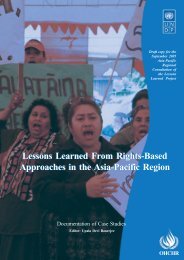View / Download - HRBA Portal
View / Download - HRBA Portal
View / Download - HRBA Portal
You also want an ePaper? Increase the reach of your titles
YUMPU automatically turns print PDFs into web optimized ePapers that Google loves.
Participation of the disabled population in elections in Afghanistanvoting, burden of household chores, familyresponsibilities, limitations on movement andcontempt or neglect from others, etc.The picture that emerges of this marginalizedgroup is one of extreme vulnerability, subsistenceor below subsistence living, very limited copingcapacity, no inclination for deferred gratificationand, hence, very restrictive strategic agency orcapacity for strategic choice.Infrastructural and institutional issuesInfrastructure problems too have directly plaguedparticipation and elicited the decision of selfexclusionamong the disabled: bad roads,inaccessible polling stations, personal immobilityand lack of good wheelchairs, bicycles, or suitableassistants to help when travelling to the poll.Moreover, survey respondents conducted for thispresent study have clearly and not-so-clearlyreported different forms of neglect, indifferenceand other discriminatory practices when theycome in contact with different public institutionsand government service providers. Yet, there isclear and overwhelming interest among therespondents in a future of inclusive politics andimproved governance in Afghanistan.In another recent survey, conducted by theUNICEF-supported Afghan Disabled Union,most disabled respondents felt that the newconstitution was unsatisfactory as it onlycontains a short paragraph about them. GivenAfghanistan’s fledgling institutions, it isn’t entirelysurprising that this dissatisfaction extends to theperformance of line ministries. Indeed, only aminority of people appear to be satisfied with thegovernment’s performance and service delivery;the same people believe that the governmentshould seek outside help, including frominternational agencies and disabled persons’organizations, in order to improve on all thosescores. 8The rational irrational?More challenging is the problem of decisions thatseem individually rational but might well becollectively irrational. How can that which is in therational interest of an individual be bad for society?In this respect, the literature on the discriminatoryeffects of preference formation and on poverty trapsis instructive.Ethnically segregated communities, for instance,are known to emerge where individuals possess‘mild’ preferences to living in neighbourhoods withethnic majorities, even if all individuals wouldideally wish to live in integrated communities.Hence, apparently harmless and mild preferencesof otherwise well-meaning individuals can lead todetrimental, exclusionary outcomes. Similarly, peergroup effects that lead to poverty traps aresometimes known to appear rational to anindividual who is a group member. But when allmembers behave similarly, it collectively provesdetrimental to the group as a whole by entrappingits members in impoverished conditions. In otherwords, when the behaviour of one groupmember is dependent on the behaviour ofothers, it can lead to a self-reinforcingbehaviour. Within a given behaviouralconfiguration, however, each individual maybe acting ‘rationally’. But that does not mean thateach configuration is equally desirable from theperspective of the members of the group, in thesense of avoiding a poverty trap. 98Afghan Disabled Union, Survey on the Problems of Barrierfree Access for People with Disabilities in the city of Kabul, Afghanistan, 2004.19



